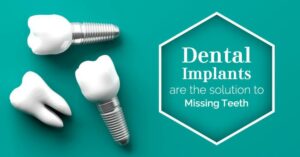How Gum Disease is Treated: a simple guide that help you to understand how to treat gum disease.
Table of Contents
How Gum Disease is Treated :
Have you noticed signs of gum disease—such as red and swollen gums, or loose teeth—but don’t know how to treat it? You may be feeling overwhelmed by the options available; however, with the right advice, you can tackle the issue quickly and effectively.
Gum disease, also known as periodontal disease, is a serious condition that affects millions of people around the world. Left untreated, it rapidly progresses and can cause significant damage to your teeth and gums. It’s essential that you talk to your dentist about ways to prevent and treat the condition in order to keep your mouth healthy for years to come.
In this comprehensive guide we will discuss how gum disease is treated by providing an overview of different treatments available. We’ll cover what’s involved in each type of treatment, as well as potential risks associated with each option so that you can make an informed decision if needed.
If you need help with treating gum disease, we’re here! We provide all kinds of affordable gum treatment plans to fit your needs. Get in touch with us today and let us help you on your journey to better oral health.
What is Gum Disease?
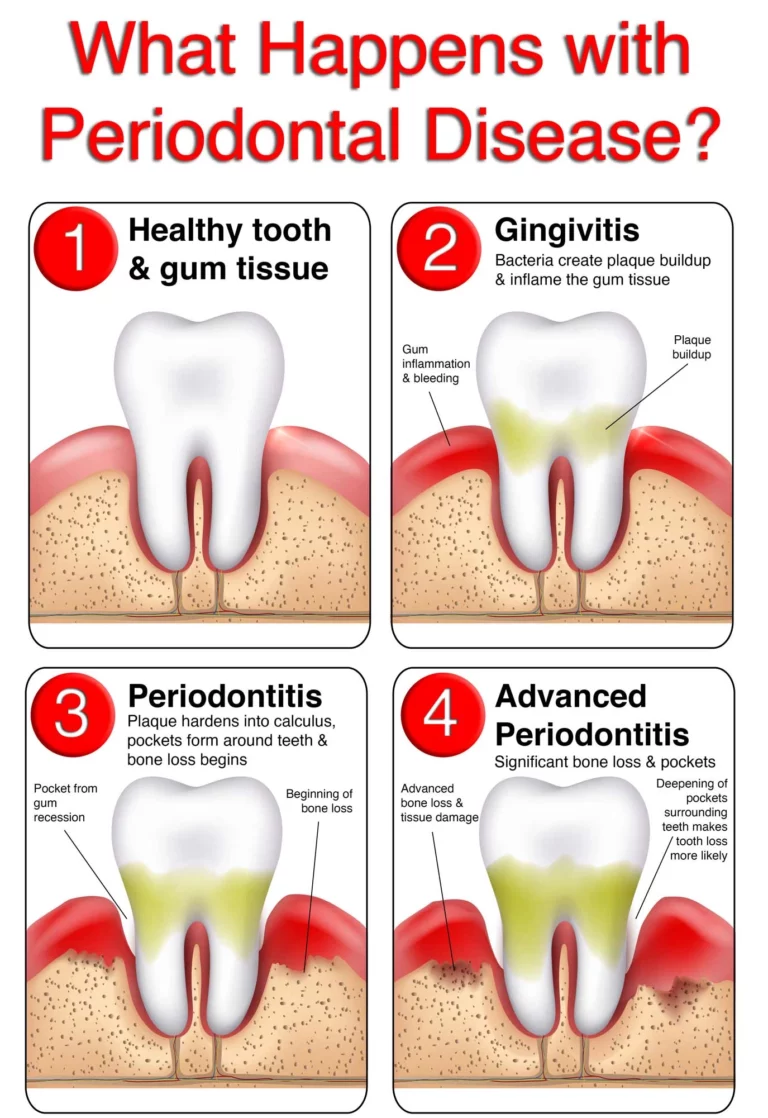
Have you been experiencing swollen and bleeding gums lately? It may be a symptom of something more serious – Gum Disease.
Gum Disease, also known as periodontal disease, is an infection of the tissues that surround your teeth and gums. It occurs when bacteria accumulate in your mouth and form plaque buildup which damages your gum tissue. If not treated early on, Gum Disease can cause severe damage to the structure of your teeth.
Gum Disease is a serious oral health issue that should not be taken lightly. Left untreated, it can result in tooth decay, receding gums, lost teeth, pain and even bad breath. Learning about the causes and types of Gum Disease is important in order to take necessary steps towards prevention and treatment. In this article we will discuss what Gum Disease is and how it can affect you.
Stages of Gum Disease
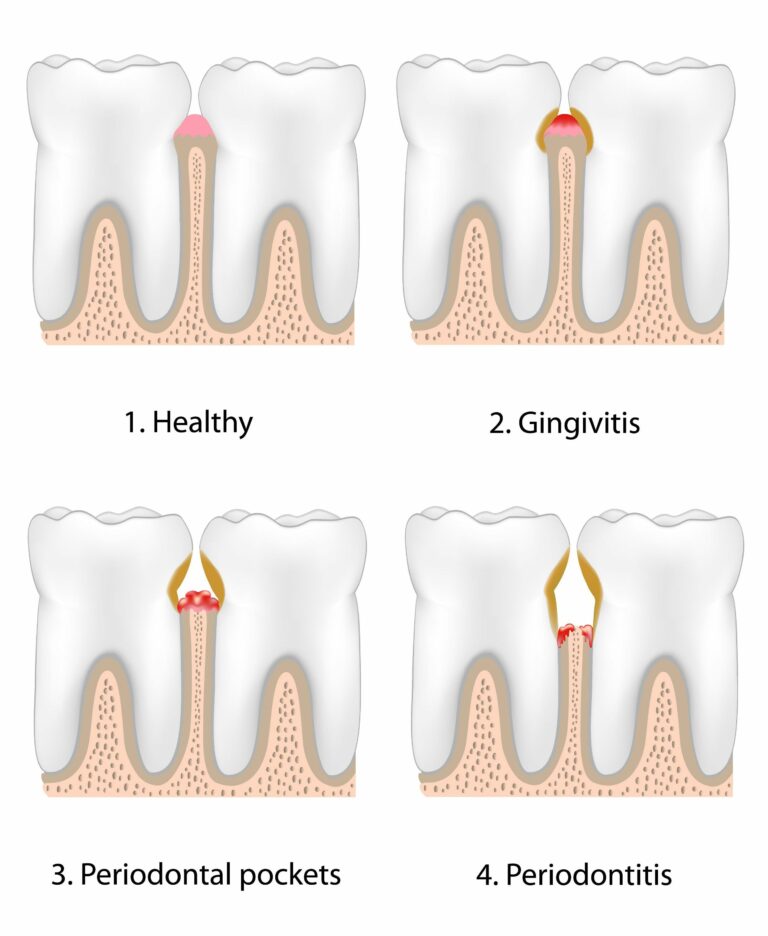
Gum disease typically progresses through three stages:
Gingivitis: This is the early stage of gum disease, characterized by inflamed, red, and bleeding gums.
Periodontitis: If left untreated, gingivitis can progress to periodontitis, where the gums start to pull away from the teeth, forming pockets that become infected.
Advanced periodontitis: In this stage, the supporting bone and fibers that hold the teeth in place are destroyed, leading to tooth loss.
How is Gum Disease Treated?
The treatment for gum disease depends on the severity of the condition. In the early stages, gingivitis can often be treated with simple changes to oral hygiene practices. However, more advanced cases of gum disease may require more extensive treatment.
Non-Surgical Treatments For Gum Disease
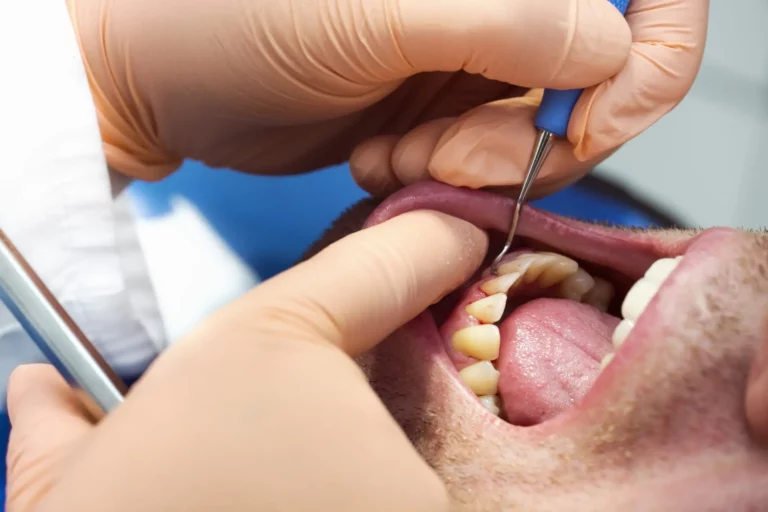
Non-surgical treatments for gum disease include:
Scaling and root planing: This is a deep cleaning procedure that removes plaque and tartar from below the gum line and smooths out rough spots on the tooth root to prevent bacteria from accumulating.
Antibiotics: Topical or oral antibiotics can be used to control bacterial infections in the gums.
Dental cleanings: Regular dental cleanings can help prevent and manage gum disease by removing plaque and tartar buildup.
Surgical Treatments For Gum Disease
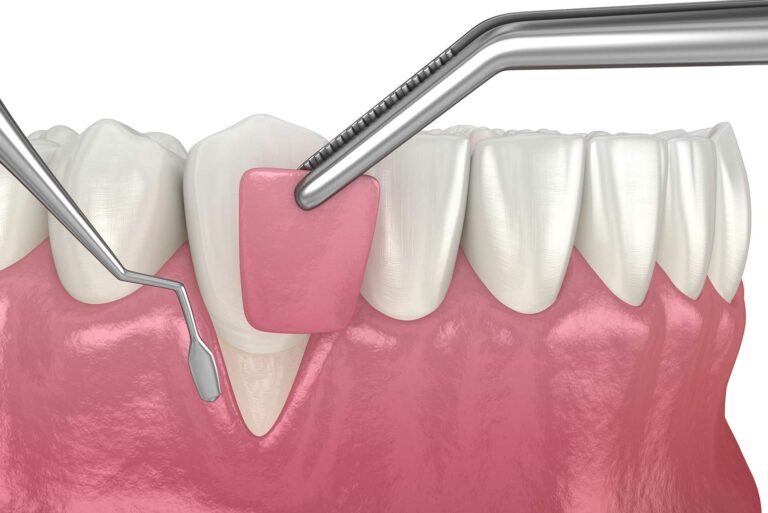
In some cases, surgical treatments may be necessary to manage gum disease. These include:
Flap surgery: This procedure involves lifting the gums and removing tartar buildup before securing the gums back in place.
Bone grafts: If gum disease has destroyed bone tissue, a bone graft may be necessary to restore the bone and support the teeth.
Soft tissue grafts: In cases where gum tissue has been lost, a soft tissue graft can be used to restore the gum line.
Laser therapy For Gum Disease
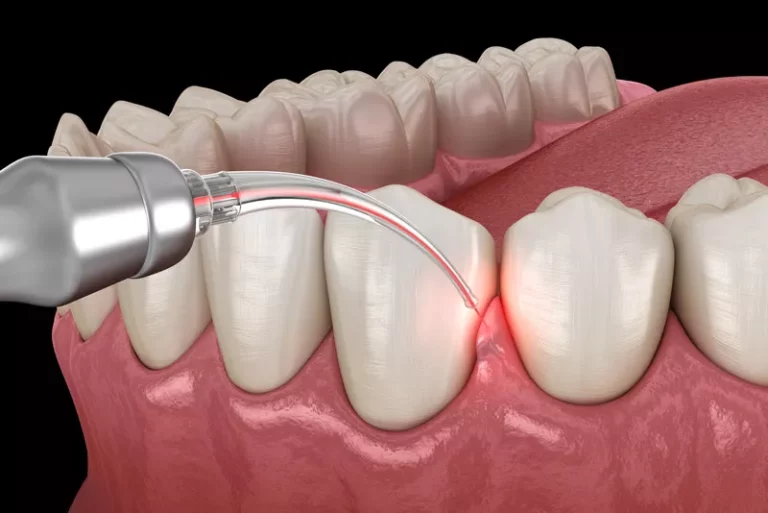
Laser therapy is a modern treatment for gum disease that leverages a laser to remove bacteria and infected tissue from the affected area. It is less intrusive than surgery and can be more pleasant for patients. Additionally, it stimulates the development of healthy tissue and reduces inflammation in the gums.
Maintenance Of Your Gum Health

After treatment for gum disease, it is important to maintain good oral hygiene to prevent the condition from recurring. This includes regular brushing and flossing, as well as routine dental check-ups and cleanings. The dentist may also recommend using a special mouthwash or toothpaste to help reduce the risk of infection and maintain oral health.
Prevention of Gum Disease

Prevention is the best way to manage gum disease. Here are some tips to keep your gums healthy:
Brush your teeth twice a day with fluoride toothpaste.
Floss daily to remove plaque and food particles from between your teeth.
Use an antiseptic mouthwash to kill bacteria and freshen your breath.
Eat a healthy diet rich in fruits, vegetables, and lean protein.
Avoid smoking and tobacco products, which can increase the risk of gum disease.
does gum disease go away when teeth are removed
Have you noticed that when your teeth are removed, your gum disease can sometimes disappear too? Is this a coincidence or is there something more going on beneath the surface? In this article we’ll explore if and how gum disease can go away with tooth removal.
The short answer is yes, gum disease can go away when teeth are removed. It’s important to note that it doesn’t happen in every case – some people may still experience lingering gum diseases regardless of teeth pulled out. However, removing the teeth makes it easier for your mouth to heal since the infection-causing bacteria is gone from the infected area.
Cleaning and Flossing:
When you have gum disease, cleaning and flossing regularly helps remove plaque and bacteria that cause further irritation and inflammation around the gums. But without any teeth to floss around – or get in between! – removing plaque from those areas becomes much easier. Without those pockets of plaque, your chance of getting rid of the gum disease increases significantly.
Unhealthy Tissue Removed:
Another factor to consider is that when teeth are removed, some unhealthy tissue gets taken out as well. Gum disease causes inflammation and damage to gums, so getting rid of diseased tissue also helps reduce your risk of further growing infections or recurrences. This is especially true if you’re having surgery – depending on what type and why, surgeons may clean up affected areas while they’re already working in them.
Getting Remaining Teeth Examined by a Dentist After Removal
It’s essential to pay special attention after a tooth extraction since infection or decay can affect remaining teeth as well as surrounding healthy tissue if not addressed quickly enough. That’s why it’s recommended you visit an experienced dentist who can evaluate existing dental health and recommend any necessary treatments or preventive care for maintaining good oral hygiene practice at home afterwards.
Conclusion
Gum disease can often go away after a tooth has been removed because it eliminates sources of food for bacteria that live in these hard-to-reach parts of our mouths, as well as removes both bacterial build up and unhealthy tissue from the infected area itself. While bigger Inflammatory problems – like periodontitis – aren’t always solved through oral surgery alone, it certainly helps reduce further complications down the road if combined with proper brushing & flossing techniques (see standard recommendations), timely visits to dentists & hygienists for extra assessment/therapy
how long can you live with gum disease
Gum disease can significantly reduce your quality of life and can even be life-threatening. If left untreated, gum disease can develop into advanced stages that can lead to tooth loss and even systemic illnesses like stroke, Alzheimer’s, and cardiovascular diseases.
In some cases, extensive damage done by gum disease can take forever to heal or may never heal at all. However, with proper oral hygiene and regular dental checkups, gingivitis and periodontal diseases can generally be reversed or eliminated altogether.
With good care, individuals living with gum disease are often able to maintain a healthy mouth and it’s possible to live with gum disease for many years without too much discomfort.
Conclusion
Gum disease can be a serious condition if left untreated, but with the right treatment, it can be managed and even reversed. If you are experiencing symptoms of gum disease, such as bleeding or swollen gums, make an appointment with your dentist to discuss your options.
By practicing good oral hygiene and seeking treatment early, you can prevent the progression of gum disease and keep your smile healthy.

Freddie Mercury's teeth and 10 other peculiar facts you might not know about the Queen frontman | Louder
Freddie Mercury had an iconic set of teeth, including his two oversized front incisors. The peculiar and distinguishing traits of the rock star’s mouth created a larger-than-life image that is still as vibrant today as it was during his life. But there are few other curious facts about Freddie Mercury than go beyond his teeth – he could play the piano, and lived mostly inside London’s luxurious Kensington District, which isn’t exactly known for its rock legends. His dentists elected to perform a variety of treatments which corrected some irregularities in his mouth while maintaining the unique look he was known for, giving us an icon who will forever be remembered in music history.

Dentakay Dental Clinic In Turkey
Founded in 2009 by Dr. Gülay Akay, Dentakay Dental Clinic has become a trusted name in dental care and health tourism. With locations in Istanbul, Ankara, Antalya, and Riyadh, plus a consultation office in London, Dentakay offers a range of services from cosmetic dentistry to dental implants. The clinic focuses on patient satisfaction, using the latest technology to provide excellent care in a welcoming, luxurious environment. Whether you’re looking for a routine check-up or a complete smile makeover, Dentakay is dedicated to helping you achieve the best possible results.

Free Consultation
Get Your Free Online Consultation. Give us more details about your needs, so we can find the perfect dentist for you. Phone + 1 315
Add your clinic
Add Your Clinic or Add Yourself as a Dentist Introduction: Welcome to our platform that connects patients with top-notch dentists and clinics in Turkey. If

Risks Associated with Getting New Teeth in Turkey
Risks Associated with Getting New Teeth in Turkey Risks Associated with Getting New Teeth in Turkey: If you’re looking for an affordable way to get




